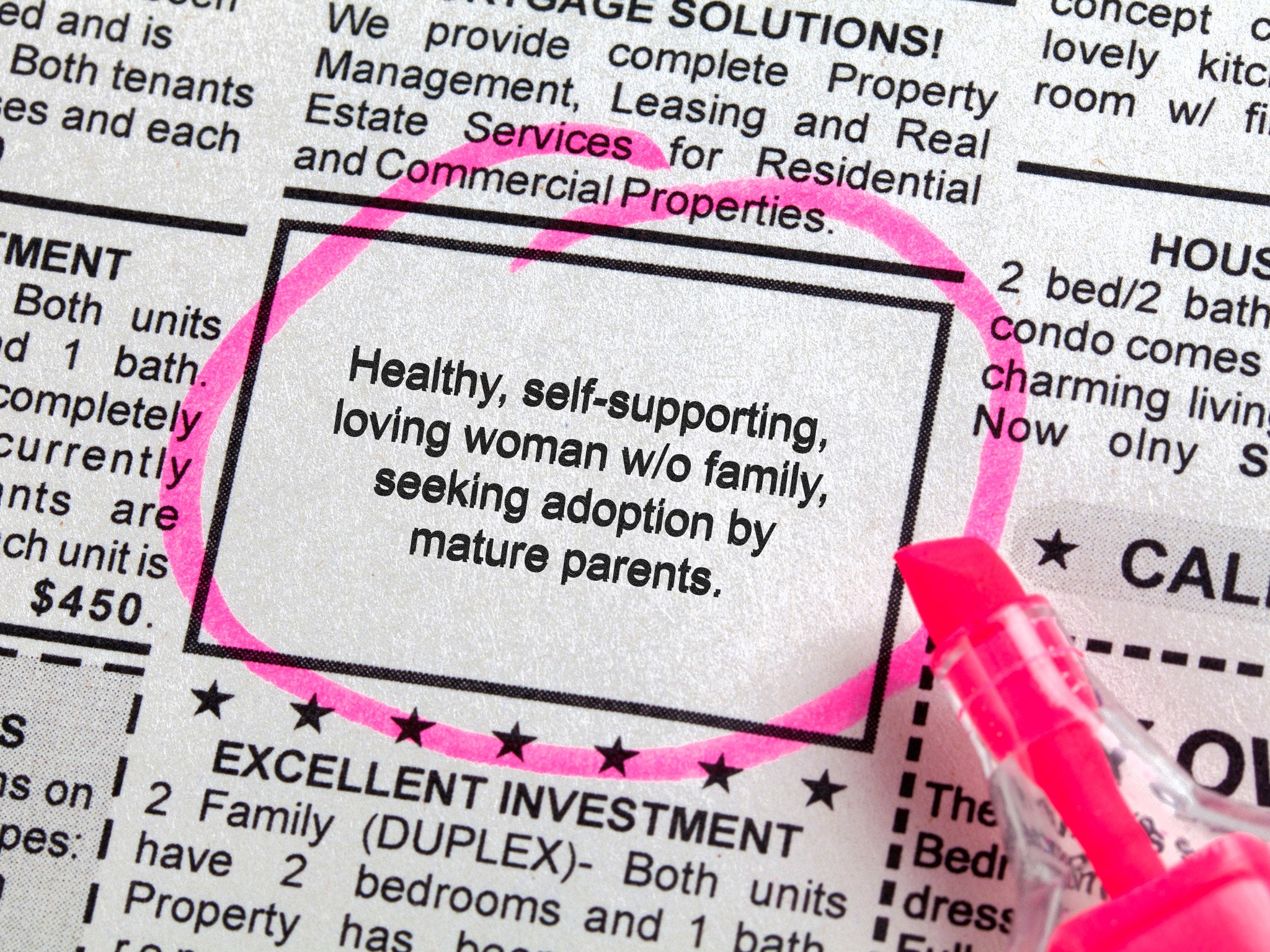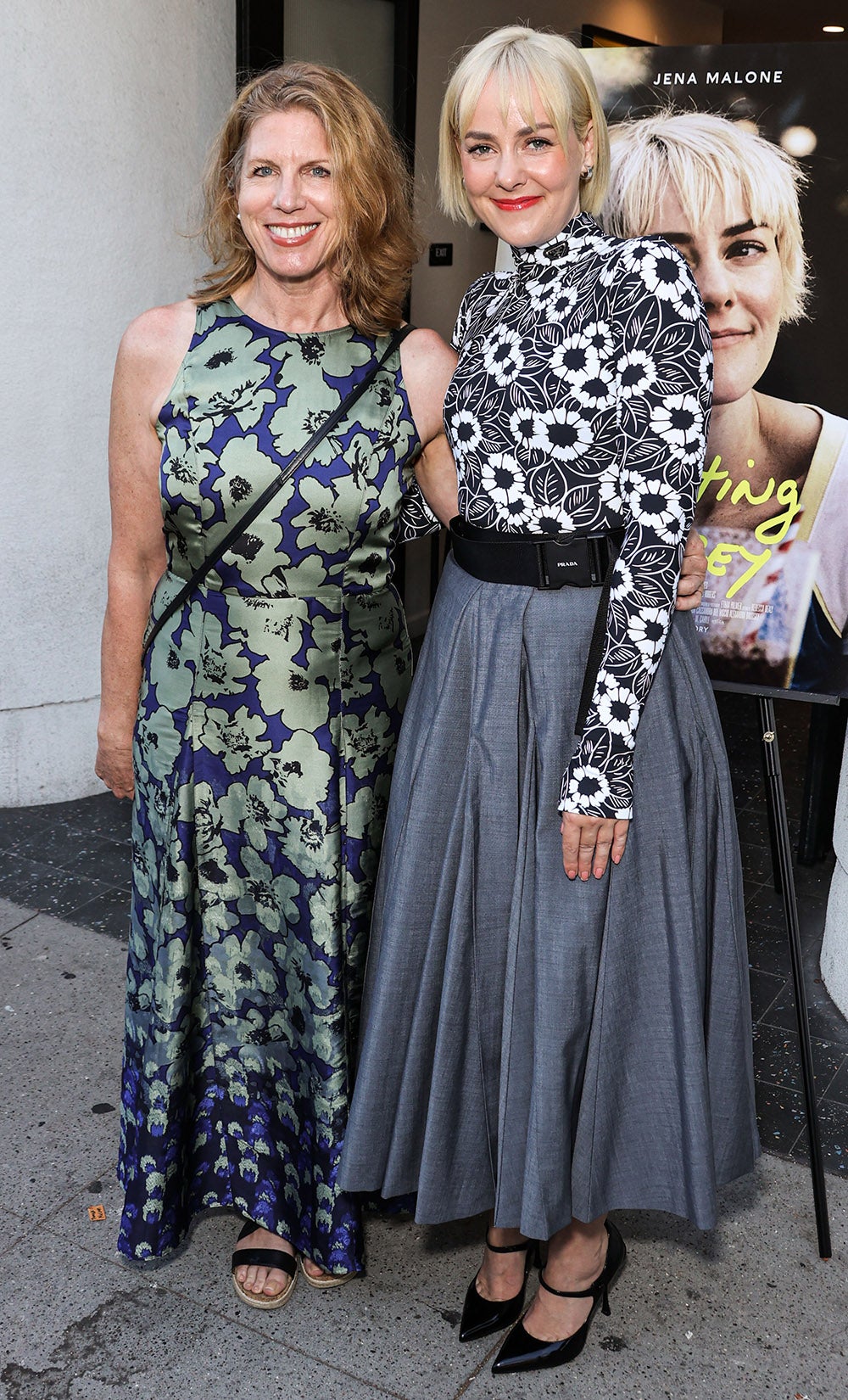Woman, 43, seeks new parents: What happened when a grown adult put herself up for adoption?
After Jenna MacFarlane and her biological parents ceased contact, she sought the family unit she always wanted... so advertised for one. As her story is turned into a film, she speaks to Dorothy Herson about her extraordinary life

Your support helps us to tell the story
From reproductive rights to climate change to Big Tech, The Independent is on the ground when the story is developing. Whether it's investigating the financials of Elon Musk's pro-Trump PAC or producing our latest documentary, 'The A Word', which shines a light on the American women fighting for reproductive rights, we know how important it is to parse out the facts from the messaging.
At such a critical moment in US history, we need reporters on the ground. Your donation allows us to keep sending journalists to speak to both sides of the story.
The Independent is trusted by Americans across the entire political spectrum. And unlike many other quality news outlets, we choose not to lock Americans out of our reporting and analysis with paywalls. We believe quality journalism should be available to everyone, paid for by those who can afford it.
Your support makes all the difference.On a Sunday morning in January 2005, readers of the North Carolina newspaper The Charlotte Observer opened its classifieds section expecting to see the usual assortment of Dyson updates and sectional sofas. Instead, they were presented with an ad posted by 43-year-old Jenna MacFarlane. It read: “Healthy, self-supporting, loving woman w/o family, seeking adoption by mature parents. Seeking to give/be accountable to a supportive family group.”
MacFarlane grew up in Los Angeles with her biological mother and father and two younger brothers. Things began to deteriorate when she hit her teens: her parents estranged themselves from their families, and instructed MacFarlane and her brothers to do the same. MacFarlane sparked further discord by maintaining communication with her grandmother and, at age 33 and following prolonged familial struggle, she and her birth parents ceased contact. “I knew in my heart that they would not open up to me,” the now 61-year-old tells me over Zoom from her home in North Carolina. “Particularly my mother. There was no hope. She was a talented artist and a wonderful storyteller. But she just didn’t want her children around, and I knew that.”
Before and after her estrangement from her parents, MacFarlane experienced depression and a yearning for a sense of belonging. She became fixated on things that she couldn’t change. She had friends but says she was seeking “something more true to the family experience – where not everybody agrees, and not everybody understands everybody. I wanted to [be] part of something that’s not ever going to go away.” It was this longing that led her to take the unusual step of asking to be adopted. She took out an ad and expected to hear nothing back. Within days, MacFarlane was inundated with responses, from couples, single parents and – less excitingly – prison inmates. “I think the story resonated with these folks,” she explains. “It really struck a chord right across the demographic.”
MacFarlane’s story is now the basis for a new film called Adopting Audrey, starring Jena Malone as “Audrey”, a fictionalised version of MacFarlane herself. Directed by M Cahill – who previously explored complex family dynamics in the Michael Douglas-starring 2007 indie King of California – the film is slow and dream-like, forgoing spectacle for moving snapshots of human life. Audrey’s story, like MacFarlane’s, is one of quick thinking and quiet endurance. I can’t pay rent? I’ll live in a van. My family don’t want me? I’ll find a new one.
As dramatised in the film, MacFarlane’s newspaper ad was answered by a woman who ended up changing her life. She still has the letter today, and pulls it out for me over Zoom and reads it aloud. It came from Karen Kesler, a benefits coordinator married to a retiree named Steve. They’d lost their respective spouses years earlier and were now in the process of setting up a blended family. Their own children had met one another, and now they wished to adopt.
The letter read: “I am really impressed by your desire to want to be included in a loving family. I don’t think it’s strange at all. There is nothing better than the warmth of a happy, well-adjusted family.” MacFarlane’s voice cracks as she reads the letter aloud to me. “It’s so warm and kind. She’s so generous and immediately took a warm, maternal tone with me. It’s just the kindness of strangers.”
Trusting another person was as if I was staring into an abyss
Soon after receiving the letter, MacFarlane met the Keslers for dinner, and despite never formalising the adoption (adult adoption, however, is legal in the United States), they started seeing each other regularly. Even today, almost 20 years later, she explains that her connection with them remains strong. “They’re people I trust so much, and I feel like I can say anything to them,” she says. “There are times in my life when I’m not sure what a solution might be, but they are excellent folks to speak to, mostly because they have a different mindset than me. They continue to be an inspiration – they’re very different from the family of my upbringing, and year after year they add to the strength of who I am as a person.”
A familiar sentiment is that you can choose your friends but you can’t choose your family. MacFarlane’s story proves that to be untrue. It also exposes a contradiction at the heart of modern life. We’re free to use apps and websites to curate our friendships, romantic relationships and our jobs, but it’s still virtually unheard of to “match” with new parents. And, in the UK at least, still not legally recognised. But while MacFarlane has previously been a big supporter of adult adoption – she once ran a website that aimed to pair estranged individuals with adoptive parents – she admits today that it’s not always the magic bullet. “I would say that many people are able to someday reconcile [with their parents],” she says. “It’s very scary cutting off a bridge to go forward when there could be some hope.”
She adds that adult adoption is deeply nuanced and complex, too, which is why she grew reluctant to talk about her experience once it was picked up by the media. MacFarlane agreed to an interview in Glamour magazine in 2006, and then another on Good Morning America in 2007. More than that seemed excessive, though. She even turned down a request to speak on Oprah Winfrey’s talk show (which she “really regrets” now). She tells me that she and the Keslers were just “too exposed” back then.
“We hadn’t had much time together to build a really good relationship,” she says. “That was to come. In my mind there wasn’t a whole lot to talk about in that moment other than they’re wonderful people and I was so fortunate to cross their paths. I was so lucky. But I hadn’t had the time with them to understand how to develop as a human being.”

It’s also why Adopting Audrey took so long to get made. Many filmmakers had tried to get MacFarlane to sign over the story rights to her life, but it was only Cahill that put in the years of work she needed to trust in him. “Trust was certainly one of those elements that I was missing – [trusting] another person was as if I was staring into an abyss.” Over seven years of building a friendship with Cahill, MacFarlane learnt how to have confidence in another person.
When I liken Audrey’s perseverance in Adopting Audrey to MacFarlane’s own tenacity, she laughs. “I don’t know if [I’m brave], but I love that you’ve romanticised it.” She does, however, believe that Cahill’s film has the capacity to inspire those who need it. “Sometimes, if people just feel less alone, and they feel like somebody understands [them], that goes a long way in healing.”
MacFarlane says that adult adoption has given her “an ability to start focusing back on my life”. She asks herself a number of rhetorical questions. “What are my goals? What are my dreams? What are the things that were interrupted when I got on this obsessive loop about what I couldn’t change?” She pauses for a moment, running a hand through her reddish mane of hair. “I guess that for somebody who felt like they were just drifting around in the open sea, [I’ve] finally arrived at an island.”
‘Adopting Audrey’ is available to rent or buy here



Join our commenting forum
Join thought-provoking conversations, follow other Independent readers and see their replies
Comments